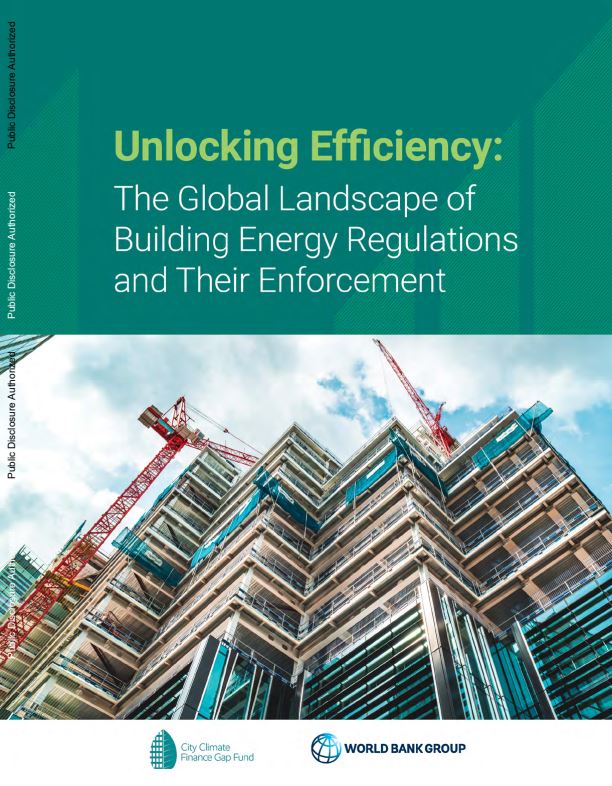
Building a Better Future: World Bank’s Latest Report on Global Energy Codes
The World Bank has recently released its latest energy efficiency report which provides a comprehensive analysis of building energy codes across 88 countries. The report highlights the urgency of improving the energy efficiency of buildings to reduce global emissions.
The World Bank has recently released its latest energy efficiency report, Unlocking Efficiency: The Global Landscape of Building Energy Regulations and Their Enforcement, which provides a comprehensive analysis of building energy codes across 88 countries.
The report highlights the urgency of improving the energy efficiency of buildings to reduce global emissions. It notes that in 2023, 2.55 billion square meters of floor space were built without mandatory energy efficiency requirements. This continued laxity in energy efficiency requirements jeopardizes global climate goals.

Methodology Within the Energy Efficiency Report
The report involved a multi-phase methodology that included:
- Data collection from 88 countries using online questionnaires in five languages and Word documents.
- A city-level analysis, focusing on one representative city per country to account for variations in building energy codes at the local level.
- Climate zone classifications based on the ANSI/ASHRAE Standard 169-2020 to provide a more accurate analysis of building energy efficiency requirements.
- Expert surveys targeting professionals in architecture, engineering, environmental consulting and academia to gather insights on building energy efficiency standards.
- Desk research focusing on national building energy efficiency standards, with a targeted approach to select one city per country for detailed analysis.
The combination of quantitative data from desk research and qualitative data from expert surveys aimed to provide a comprehensive understanding of building energy codes and their implementation across different contexts.
Energy Efficiency Report Findings
The report emphasizes that building energy codes are a powerful tool for governments to achieve their emission reduction targets under the Paris Agreement. However, many countries face challenges in implementing effective codes, including technical capacity constraints, enforcement issues and limited resources.
Key findings of the report include:
- Urgency for Action: The report emphasizes the increasing urgency to reduce emissions within the building sector, noting that a significant portion of new construction lacks mandatory energy efficiency requirements.
- Regional Disparities: While 71 countries have adopted mandatory building energy codes, only 52 demonstrate consistent enforcement, with significant regional disparities observed.
- Enforcement Gaps: Effective implementation is hindered by varying enforcement quality, with many countries lacking comprehensive systems for inspector qualification and oversight.
- Scope and Stringency: Existing building energy codes often have gaps in scope and stringency, particularly concerning existing building retrofits and the phase-out of fossil fuels.
- Context-Specific Strategies: Successful implementation requires tailoring strategies to the local economic capacity and market readiness of each country.
- Effective Implementation Models: Successful implementation models, emphasizing the importance of phased implementation, regional cooperation and robust enforcement systems.
Overall, the report underscores the need for accelerated and improved adoption and enforcement of building energy codes to unlock energy efficiency and meet global climate goals.
Support Through the International Code Council
The International Code Council plays a vital role in supporting the World Bank report’s recommendations in several ways:
- Promoting and Enhancing Building Energy Codes: The Code Council’s International Energy Conservation Code® (IECC) is a widely recognized model code that establishes minimum energy efficiency requirements for buildings. Countries seeking to improve their building energy code can adopt and implement the IECC and its provisions to help create a more sustainable and resilient built environment.
- Providing Technical Assistance and Training: The Code Council offers technical assistance, training and educational resources on the IECC and energy-efficient building practices. These resources can help policymakers, building professionals and enforcement officials understand and implement effective building energy codes.
- Facilitating Knowledge Sharing and Collaboration: The Code Council can serve as a platform for knowledge sharing and collaboration among countries and organizations working on building energy efficiency. This can help disseminate best practices and lessons learned in building energy code development and implementation.
- Supporting Capacity Building: The Code Council contributes to capacity-building efforts by providing training and certification programs for building officials, inspectors and other stakeholders involved in the building sector.
By leveraging its expertise and resources, the Code Council continues to be a valuable partner in advancing the World Bank report’s goals and driving greater energy efficiency in the building sector.
Read more about the report in full here.






